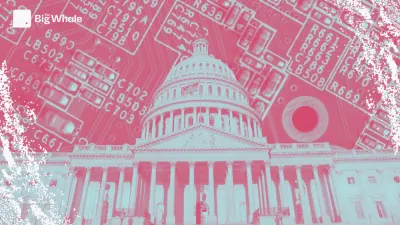The Big Whale: The political debates around Bitcoin in the US are attracting a lot of attention. What's your take on it?
Yorick de Mombynes: What's happening in the US at the moment is, to my mind, encouraging. There is certainly an element of opportunism, which is inevitable in a clientelist and demagogic democracy, where it is necessary to promise as much as possible. But there is also a significant difference between the two political camps, which is striking. In one camp, there are more influential figures in favour of cryptocurrencies, while in the other, several heavyweights are fiercely opposed to them. This is the first point of divergence. In addition, we can see that one of the candidates has taken the initiative in a thunderous manner, with a somewhat disordered and confused style, but multiplying proposals and one-upmanship. On the other hand, the other camp expressed itself on the subject late, timidly, cautiously, as if constrained. We can also look at the liabilities: the Biden administration has been very hostile to cryptos and very supportive of central bank digital currency (CBDC) projects. In my view, MNBCs represent Bitcoin's mortal enemy. In fact, it is rather the latter that will defeat the MNBCs.
Do you see a political confrontation between Bitcoin supporters and MNBC supporters?
It is clear that a direct confrontation is brewing between Bitcoin, cryptos in general, and the MNBCs, and it is Bitcoin that will prevail. In my opinion, it is simply impossible to be pro-Bitcoin while supporting MNBC. Maybe Trump doesn't have a very well-developed vision on the subject, but he has clearly come out against MNBC and expressed his support for Bitcoin. The fact that Bitcoin is now part of the American public debate is extremely interesting. It shows that the candidates have understood that there is an electoral base around these issues. It also contributes to public education and reinforces the legitimacy of the subject. Even when Trump, who may seem whimsical, talks about it, it brings the subject back into the political discussion, which is beneficial.
Are you surprised by Donald Trump's pro-crypto stance?
True liberalism is rare these days, even among Republicans. The founding ideals of the United States were based on decentralisation and individual sovereignty, and Republicans carried these values more, particularly under Reagan. However, over time, with the influence of the neo-conservatives, they have evolved towards a more assertive statism. I was therefore convinced that both Republicans and Democrats would oppose Bitcoin. So I'm quite surprised to see Republicans mostly in favour of cryptos or, at the very least, less hostile.
"Trump built part of his success by rejecting the centralising, statist elite of the Republican party" How do you explain this?
It can be explained by Trump's atypical political career. He built part of his success on rejecting the centralising, statist elite of the Republican party. Many Republican voters were fed up with what they perceived as a Washington nomenklatura, close to the Democrats and politically correct. Trump came along and turned everything upside down, exploiting this frustration to reconnect with the founding ideals of the United States, albeit with a whimsical, demagogic and unpredictable style. It is this political positioning that has led him, quite logically, to support cryptos, as they too embody a distrust of centralised power.
We still think it's surprising that Trump would support an instrument that competes with the dollar...
You'd think that all the candidates would want to protect the dollar first and foremost, considering it a priority. In fact, that's what Trump said at the very beginning. So it's surprising that they don't see Bitcoin as a threat to the dollar. They seem to think that, for the moment, Bitcoin is not powerful enough to pose a real danger, which allows them to be ostensibly in its favour.
As a Bitcoin supporter, are you pleased that Trump is becoming an ambassador?
In my opinion, there is no bad news for Bitcoin. Any publicity is good for it. If Marine Le Pen or Jean-Luc Mélenchon expressed their support for bitcoin tomorrow, that would be good news, even if we might have reservations about them. Personally, I have no particular admiration for Trump, but I'd rather he spoke well of Bitcoin than try to torpedo it. Politics is the art of choosing the lesser evil, the least harmful. The state will always represent a threat to Bitcoin, but when state representatives decide not to destroy it but, on the contrary, to show support for it, that becomes excellent news. It's comparable to the recognition of Bitcoin as a legal tender in El Salvador. Although the essence of Bitcoin is its independence from any state tutelage, this recognition is preferable to a head of state who would seek to eradicate it.
Do you think that Trump, by supporting Bitcoin, could get himself into trouble in the longer term?
Yes, because by promoting Bitcoin, Trump is contributing to its rise but sawing off the branch on which he is sitting as a statesman and political player. In the end, Bitcoin will triumph. So if bitcoin's opponents, whether through ignorance, demagoguery or short-term clientelism, end up supporting it without realising it, so much the better.
"I'd be prepared to help any party that was in favour of Bitcoin, even the Communist Party" The crypto industry has spent a lot on lobbying in recent months, what does that inspire in you?
It's a fine example of crony capitalism. We are no longer in a classic democracy, nor in a free market. We are in a system where economic interest groups invest massively in the campaigns in order to profit from them. It's a contamination of the crypto industry, but it's also a problem that goes beyond that sector. For my part, I'm focusing on Bitcoin. If these players, through their lobbying activities, help to promote Bitcoin, so much the better, even if this is done through regrettable channels. Nevertheless, we can also deplore the fact that some people are harming Bitcoin within the crypto industry.
Are you referring to disinformation campaigns?
Yes, crypto players have, for example, contributed to disinformation campaigns about Bitcoin's environmental impact, to promote their own projects. For example, Ethereum emphasised the energy benefits of its move to proof-of-stake, even though their approach was not explicitly hostile. Others, more virulent, campaigned on the fact that "Bitcoin is dirty", denouncing its energy model.
In Trump's proposals for Bitcoin, there are also measures around mining. Does this seem relevant to you?
This idea above all shows that he doesn't really understand the issues surrounding mining. That said, what he says nevertheless anchors, even marginally, what he might do next. It reflects the pressure exerted by the lobbies that support him. If Trump is influenced by US mining lobby groups, that's entirely possible. It's common to see politicians justify sovereignty over industries as strategic, and this logic is starting to apply to Bitcoin mining.
During the European elections, only the Pirate Party took a stand in favour of Bitcoin . You once worked with François Fillon, could you consider getting involved with the Pirate Party?
I don't know much about the Pirate Party, and I've sometimes seen contradictory positions. That said, I would be prepared to help any party that is in favour of Bitcoin, even the Communist Party.
El Salvador has recognised Bitcoin as a legal currency, do you think other countries will follow suit, particularly Argentina?
Argentina is considering dollarisation and then, it seems, total currency competition. But for the time being, it remains cautious about Bitcoin, which is disappointing, especially as President Javier Milei had previously made very favourable statements about Bitcoin. His cautious approach is no doubt influenced by Argentinian economists who are sceptical about Bitcoin, such as Nicolas Cachanosky. As for El Salvador, other small countries could follow President Nayib Bukele's example. Many countries are watching El Salvador closely and seeing that it is not a disaster, contrary to what was predicted.
Finally, in Europe, there is growing interest in central bank digital currencies. How do you perceive this as a European?
To me, CBDMs are worrying and dangerous projects, despite the reassuring rhetoric from central banks and their opinion multipliers. It is interesting to note the differences in approach between Europeans and Americans, with the latter appearing to be more cautious and pragmatic. Some people think that these digital currencies are too complex to implement, but I think they are wrong. Central banks and the Bank for International Settlements (BIS) have been working on this for years. It's a carefully thought-out ambition, and these initiatives will see the light of day.
What do you see as the greatest risks of CBMs?
CBMs concentrate two major risks. Firstly, economic control, with a hyper-expansionary monetary policy and negative interest rates, coupled with the disappearance of cash. On the other hand, political control and surveillance of individual spending, a dystopian prospect in countries that are supposed to be democratic. We have seen in recent years how quickly democracies can adopt liberticidal measures that we would never have imagined.
Heading 1 Heading 2 Heading 3 Heading 4 Heading 5 Heading 6 Lorem ipsum dolor sit amet, consectetur adipiscing elit, sed do eiusmod tempor incididunt ut labore et dolore magna aliqua. Ut enim ad minim veniam, quis nostrud exercitation ullamco laboris nisi ut aliquip ex ea commodo consequat. Duis aute irure dolor in reprehenderit in voluptate velit esse cillum dolore eu fugiat nulla pariatur.
Block quote Ordered list
Item 1 Item 2 Item 3 Unordered list
Text link
Bold text
Emphasis
Superscript
Subscript





